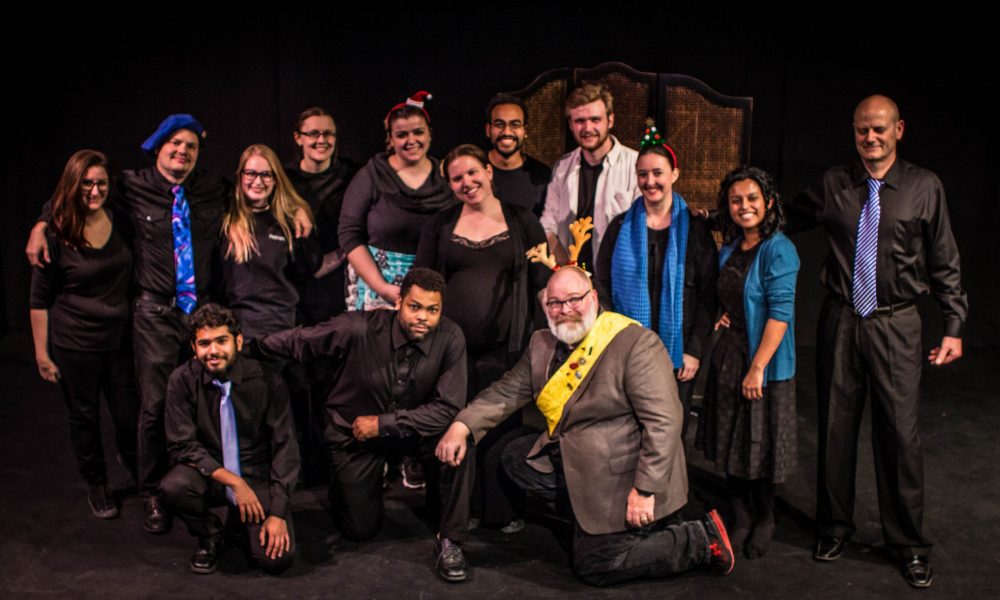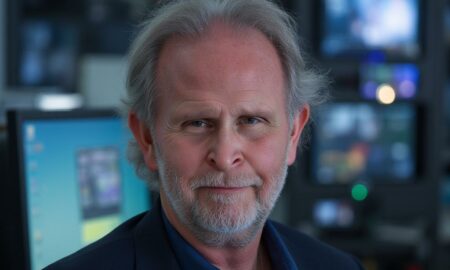

Today we’d like to introduce you to Julia Nelson.
Julia, please share your story with us. How did you get to where you are today?
I started this company in 2015 to put aspects of Shakespeare’s own business model into practice. When Shakespeare was a sharer in the Lord Chamberlain’s Men (the company that built The Globe), performances looked very different from most of the shows that audiences are used to seeing today. These were the days before the Fourth Wall, before electricity, before movies. The actors put plays together with only a handful of rehearsals, no director, and hardly any design elements. Because of the sparse technical requirements and short rehearsal process, more of the company’s resources could go toward expanding their repertoire and paying their collaborators. Bare Bones Shakespeare strives for the same standard: to treat our collaborators as “sharers” in the production, and to focus on the interaction between the actors, the audience, and the text.
As a young actor, I was often frustrated with the prevailing attitudes towards art and artists. What I found particularly offensive were the assumptions that art is not a “real” job, and that “star power” gives famous and/or talented artists the right to treat others with disrespect. Part of the reason why I founded Bare Bones Shakespeare was to actively combat these assumptions through the day-to-day workings of the company. In order to make artistic work the primary day job for our actors, our long-term goals include expanding our touring program to get more live Shakespeare into schools, libraries, prisons, community centers, and senior centers. We also frequently use a version of Shakespeare’s shortened rehearsal process, known as our signature company-directed style. This style allows the actors a great deal of agency, which is an exciting experience; as directors, designers, and dramaturgs for their own roles, actors can make each production and each role their own.
Has it been a smooth road?
Theatre is a challenging art form to try to make into a business in the USA in 2018. Our culture is not sure whether or not it considers art a charity, and audiences are hungry for content but rarely want to invest the amounts of capital that can actually support the sheer volume of education, training, and preparation that it takes to create good theatre. Most actors expect that they will be working for free, and the underlying assumption is more insidious than it appears: right now, most producers can’t find a business model that will let them pay actors what they’re worth, so most of them are willing to trick themselves into believing that actors are worth nothing. Bare Bones Shakespeare is trying to invent (and re-invent) business models that will allow us to charge a fair price so we can pay a fair wage, but the road is bumpy. We don’t have many examples for what we’re doing, so we have to try, fail, adjust, and try again.
Bare Bones Shakespeare has a mantra: “Let’s try it!” We endeavor to maintain an exuberant attitude of experimentation, which, yes, often leads to exuberant (but productive) failure. We believe that it is better to try, and fail, and learn than to cower in fear of our own potential embarrassment. Actors are constantly embarrassed, after all. It’s in the job description.
In addition to butting heads with the prevailing culture, we have experienced many individual setbacks with collaborators, venues, timing, money, and health, just to name a few. However, most of these problems can be distilled down into issues with communication. Whether you’re at the beginning of your journey or you’re a veteran trailblazer, we recommend that you constantly work to improve their own communication skills. Strive to put everything you say, type, text or tweet, through this battery of questions: Is it necessary? Is it true? Is it timely? Is it kind? Would my mentors be proud of me? Will the next generation be proud of me? How can I improve myself?
We still work hard to stay mindful and proofread our thoughts and actions so that we answer these questions in the affirmative. It isn’t easy, and we definitely don’t always succeed, but this is a goal that has never steered us wrong.
So, as you know, we’re impressed with Bare Bones Shakespeare – tell our readers more, for example, what you’re most proud of as a company and what sets you apart from others.
Many modern production companies try to dazzle their audiences with big beautiful sets, intricate lights and sound technology, large ensembles, and glorious costumes. In creating this company, I decided to take a step back from all of those elements — lovely as they are — and focus instead on the language and the sense of community between the actors and the audience. By creating stripped-down minimalist productions, Bare Bones Shakespeare invites the audience to join in and create the world of the play together. It’s all in the name: “Bare Bones Shakespeare” means we’d rather pare down anything that doesn’t bring the actors and the audience closer together. Our productions are distinguished by our bare stage, simple costumes, fast pace, audience interaction, “wacky” approach to gender, and our exuberant sense of experimentation and discovery.
I believe that Shakespeare only wrote half of what we need to make a performance. The other half is constantly changing because the other half is the cast and the audience. There is no point in trying to do someone else’s production of a play. We will never be them, and they will never be able to be us. Instead, we focus on doing something that only we can do: we find out what makes us (as a group) unique, and we follow it through. This practice also includes our awareness that every day, we are a little (or a lot) different than we were the day before. This is why we do live theatre because two performances back to back can be vastly different from each other, and we want to let them. We encourage our audiences to see our shows at least twice, on two different weekends, so that they can join in and experience the effects of our actors’ discoveries throughout the run. The only reason it is possible to make a whole career just out of performing Shakespeare is that these plays, these words, adapt so well to different interpretations and circumstances. We consider our rehearsal rooms and performance venues as laboratories, and every day we experiment like the mad scientists we are.
Coming up from Bare Bones Shakespeare in As You Like It at Mountain View College, Hamlette at Rover Dramawerks, Othello at The Core Theatre, and an exciting new workshop series at Dallas Public Library. We are also about to launch our Patreon account so that our audiences can support our mission. Check out these programs and more at our website.
Who have you been inspired by?
Carrie Fisher is one of my greatest heroes. She taught me that it is okay to be imperfect, and it’s not just okay, it’s vital to take care of yourself. She showed the world that honesty is so much more powerful than pretending to be normal.
Brene Brown taught me about the bravery of vulnerability. Her studies confirmed and codified what I had already suspected: that the happiest people are those who do not connect individual failures to their own sense of self-worth. She gave me permission to love exuberantly and to try and fail and try again. I particularly like that she used herself as an example to show the struggles and rewards of valiant vulnerability in action.
Actresses Julie Andrews, Judi Dench, Emma Thompson, and Maggie Smith taught me that the best of my career is yet to come and that working on my craft and being a joy to work with is much more important than being born with innate talent and getting famous while still in one’s teens.
Jane Austen taught me that subtlety makes for good storytelling and that the best heroines let their surroundings affect them; in contrast, aloofness and invulnerability make for insufferable fiction. Characters need to experience doubt and failure or the audience will lose interest in them.
Sharon Benge, Beth Burns, Doreen Bechtol, and Mary Hill Cole taught me personally and taught me well. They passed along their own standards for training, professionalism, collaboration, and (of course) good scholarship. They caught me in moments of bad attitude and gently helped me readjust my thinking so that I would be a better collaborator and a better person.
Last but not least, two of the most important humans in my life weren’t humans at all: my first dog, Scarlett, taught me about loyalty and perseverance. She showed me that even (and especially) the strongest people are also unafraid to love and show their affection to those closest to them. Towards the end of her life, she proved time and again that pain and illness would never be enough to stop her from following her bliss and showing her caring nature to her family. Dixie, my second dog, taught me more about unconditional love and exuberant affection than any other relationship in my life. Not a day went by without her expressing her joy at seeing and loving her family. I miss them, but I also know that they experienced long, full lives replete with all the care and affection any person could wish. I strive to love as they loved, forgive as they forgave, and most importantly, to make every day its own best example of my affection and perseverance.
All of these women are constant reminders as well that I, as a leader, am also a role model. I try to be as kind, thoughtful, and inspiring — and when I fail, I try to be a good example of honesty and bravery, for the hardest and most important thing to do when one fails is to admit fault and use it to discover new things about oneself.
Contact Info:
- Website: www.BareBonesShakespeare.com
- Phone: 469-701-3228
- Email: BareBonesShakespeare@gmail.com
- Facebook: https://www.facebook.com/barebonesshakespeare/
- Twitter: https://twitter.com/BareBonesShakes?lang=en












Image Credit:
Dave Westbrook, Andrew Sherman, Lucas Haupert, Julia G. Nelson
Getting in touch: VoyageDallas is built on recommendations from the community; it’s how we uncover hidden gems, so if you know someone who deserves recognition please let us know here.

















